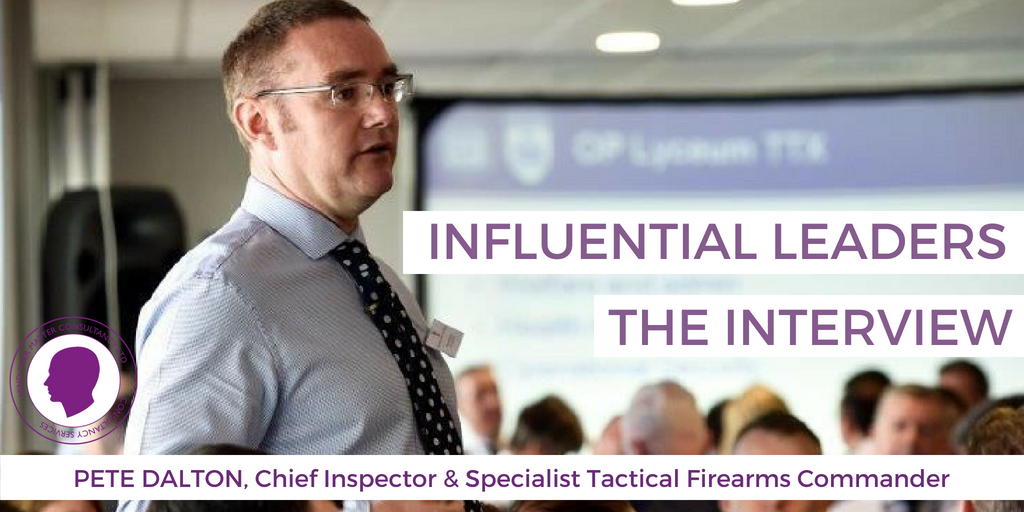PETE DALTON
Pete is an unfailingly positive, highly motivated tactical firearms commander who can be tracked down in the Canadian Rockies when off duty.

Pete is a serving Chief Inspector with 26 years’ service, the majority of which has been spent on Specialist Operations. In his current role, he is a Specialist Tactical Firearms Commander, involved in the management, command, and deployment of firearms operations.
He has commanded and supported events of National and International significance including Major Crime, Sporting, Terrorism, State and Ceremonial Events including the upcoming Royal Wedding.
Pete, Welcome to the Leadership interview
How do you start your day?
On a weekday, an early start and in the gym by 0600 hrs, a quick hour of training, shower and in the office by 0715. On a weekend, if off duty, a slower start, walk and nice breakfast.
Going to the gym early is a great routine and start to the day. It helps with planning the busy day ahead and getting into a positive & motivated frame of mind!
What was your first job and what is the worst job you’ve ever done?
I consider myself to be very fortunate and lucky in so much as I don’t think I have ‘had a job’, I have had two fantastic careers/vocations.
The first was joining the Army as an apprentice surveyor at 16. This was the gateway to five years of travel, all around the world in my role as a Field Surveyor – lots of interesting places, Greenland, Iceland, Norway, Kenya & the Gulf to name a few. During this time the Army, promotion and a Physical Training Instructors Course (PTI) helped to develop my command & leadership skills.
What advice would you give to others about furthering their careers?
Try and find a career or vocation that interests you, see if it matches your own development plans for personal and career life.
Learn all about your business, most importantly its people, informal and formal lines of command /management structures.
Take the time to ‘serve your apprenticeship’, learn the capabilities of your team and your own strengths & weaknesses.
My particular leadership roles in the Police Service and military have been in the specialist operations & command side of the organisations.
In these roles, I believe that future leaders and leaders should fully understand the capabilities of their teams & functions.
Look around you, identify strong leaders & managers, observe how they interact with and treat their teams, they will be approachable, visible and operationally competent.
Develop your informal and formal networks, seek opportunities to develop yourself professionally. Remember the three Ps of management, People (the most important), Priorities (what does your business do) and Processes (How you do it)
Who inspires you and why?
People who are passionate about what they do, positive and keen to develop their teams.
People who lead from the front, make mistakes and see those mistakes as opportunities to learn without apportioning blame. My leadership background leads me to be and have been inspired by the best Commanders at strategic, tactical and operational levels.
I won’t name those that are still serving but would signpost some military commanders such as Major John Howard, a former Police Officer, who served as an officer in WW2, built and led a specialist team of officers & soldiers who performed what was considered an almost impossible task on D-Day.
In a similar vein, Major Richard Winter an American officer portrayed in the series ‘A Band of Brothers’. Both set high standards, led by example, and more importantly led from the front.
Do you think a talent to lead is nature or nurture?
Partly nature, it is there to some extent in all of us. It has to be recognised and developed though.
The nurturing effect takes place through life and professional experience.
With regard to Incident Commanders, it is built upon experience, professional training & development and time spent performing the role.
I once read an extremely interesting book by Rona Flin ‘Sitting in the Hot Seat’. The book explored this very issue and provided case studies into Police, Fire Brigade, Military and Prison Service senior commanders.
The author concluded that operational experience supported recognition primed decision making, particularly under stress.
I agree that the more operational experience you attain, in the widest variety of scenarios enables prompt and effective decision making.
I always summarise this in the command classroom through the three Cs of effective command, Competence – operationally (know your trade), Confidence – (In your own and teams ability), Communication – (Ability to brief, engage with and form effective relationships).
It is my personal opinion that these are present in all effective leaders/managers.
How can a leader fail? Do you have a personal example?
I think we all fail from time to time and this is natural and always an opportunity to learn.
Some of the key themes relate to the ‘People’ side of our roles. Failing to engage with, listen to or take advice.
I operate in a command and control environment, particularly with regard to command of specialist operations and incidents. Knowing who to ask and when are really important.
Examples, where I have failed, have usually resulted from not following the above or not taking the time to plan effectively.
One very early example was in the Army en route down to the Falklands. We were in two teams, deploying to two separate locations to perform a surveying task. We were to be dropped off for several weeks without lines of communications.
A hasty equipment check led to the two teams mixing up essential survey mapping/kit, only discovered once dropped off.
Needless to say, we were unable to complete the task and had an enforced unproductive stay in a remote and far-flung place, on the bright side, the wildlife and environment were spectacular.
Key lesson- always check your equipment, whatever your business or role.
In the Police service we take time to plan effectively and spend equal time debriefing operations & events, this time is never wasted.
What are your greatest strengths and weaknesses?
My weaknesses are many and varied.
Impatience can be an issue and not always actively listening. On occasions trying to do two things at once! I would benefit from delegating more too.
I think my strengths are command level operational and occupational competence, obtained through a rewarding Police career in Specialist Operations.
I have planned and commanded Specialist Firearms, Public Order, Sporting, State and Ceremonial Events, being lucky enough to travel and work with a variety of people.
I am unfailingly positive, optimistic and highly motivated, I perform at my very best in fast-moving, time critical and often high threat leadership situations.
What do you find most challenging about being a leader?
Planning and preparation is very much a team event for specialist command operations.
Effective leaders recognise key individuals and build fantastic teams. However, on the day of the operation or event, leadership kicks in, you then carry significant responsibility for fast-moving, dynamic situations where competing pressures and demand can be present.
Operational leadership can also be ‘lonely’, particularly in a command & control environment whilst sat ‘in the hot seat’. Your teams will look to you and expect leadership and direction.
One of the challenging aspects is reacting quickly, thinking on your feet and activating contingencies.
Thankfully, the Police Service and the other Emergency Services have fantastic command development and leadership training.
Keeping abreast of new professional practice, developments and changing demand are all challenges. Operating in a sustained period of increased threat in the UK has also created challenges for all commanders over the last few years.
What are you most proud of?
I am immensely proud of the teams that I have had the privilege to develop, manage and lead. These have reflected professionalism, public service, and a ‘can-do attitude’.
Police Officers and the Police Service is often in the public eye, on occasions we make mistakes. There is now a 24/7 media appetite for ‘bad news’ and ‘good news’ stories. However, the confidence levels in police and policing remains rightfully very high.
I am proud to have planned, advised on or commanded internationally and nationally significant events.
Working in Thames Valley has enabled me to experience command of an Olympic Venue, Major Sporting Events, Rugby World Cup, State Visits, Royal Weddings and large Military Events.
I am currently working with a fantastic and diverse planning & command team, preparing for the Royal Wedding in Windsor later this month.
I have also been lucky or unlucky, depending on your point of view to work nationally on events such as The London Riots 2011, Major disasters, Counter Terrorism Operations and a wide portfolio of incidents.
I have held fantastic command roles leading our Specialist Public Order Team and over recent years Specialist Firearms Teams.
In my training role, I have delivered operational and command level training to officers from across the world at all levels of the incident command. Looking ahead, I retire from the Police In 2020,
I am very excited to transfer operational, command and leadership roles into new areas of work. Very keen to work with other professionals in enhancing major event safety through command training & exercises, providing security consultation and hopefully some travel.
What’s your biggest self-indulgence?
The nature of my experience and role makes me a little bit of a ‘kit monkey’. I like gadgets and high-quality PPE / Clothing. This is not unusual in my line of work!
One of my indulgences is holidays, particularly fantastic road trips to the Canadian Rockies in the summer. Probably my favourite country, great quality of life and environment. The phone coverage is poor so a two-week break from work phone and emails are always very nice.
You can follow Pete on Twitter
If it is of interest, Mind Over Matter Consultancy delivers a range of interactive, highly-pressurized programmes for high performers in companies across the world, underpinned by applied leadership and management theory. These are lead by experts in their fields.
We are able to support the following areas:
- Communication
- Leadership
- Negotiation
- Talent Identification
- Decision Making
- Motivation
- Problem Solving
- Teamwork
Try our bespoke #BlowYouAwayDays programmes where you and your team will be pushed to the limit in anything from RNLI training or kidnap scenarios to dance development, a rollercoaster crash, a grand prix circuit or the SAS.
